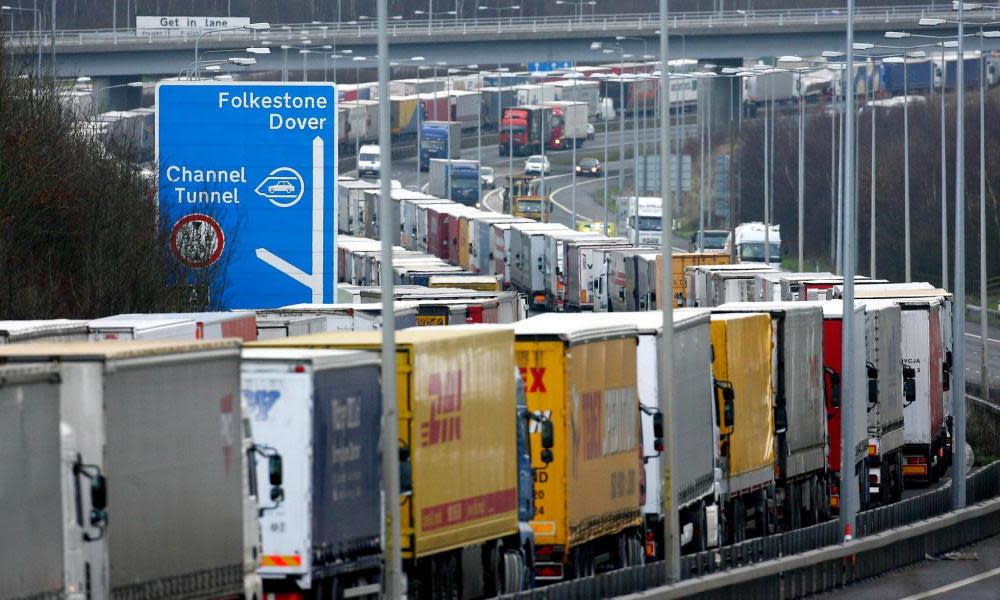Tory MPs call for action to avert post-Brexit ports gridlock

A prominent group of Conservative MPs have called on cabinet ministers to accelerate the preparation of Britain’s ports for Brexit in order to prevent “gridlock” for the British economy.
A report endorsed by the European Research Group of Tory backbenchers says urgent action is needed to improve customs checks, widen roads, speed up infrastructure projects and produce lorry parks.
It also calls for an expanded treaty with France to cover customs and a single government ministry to cover all issues relating to the border.
The document, entitled Ready on Day One, suggests there is a real possibility that no deal will be achieved with the EU27 by the spring of 2019, and says Theresa May’s government needs to prepare for that potential outcome.
“Gridlock at the channel ports will mean gridlock in the UK economy,” says the report, highlighting how disruption in Dover in 2015 resulted in queues of 4,600 lorries stretching back 30 miles, and four days of disruption at a cost of £1bn.
The report, written by the ERG’s treasurer, Charlie Elphicke, the MP for Dover, says that with “proper planning” the UK could be ready for Brexit.
Elphicke has presented his findings to the chancellor, Philip Hammond, and the transport secretary, Chris Grayling, on whom he promised to “keep up the pressure”. He and seven other Tory MPs in coastal constituencies have discussed the report with the Brexit minister Steve Baker, who chaired the ERG before entering government.
The group, which comprises both remain and leave campaigners who are now committed to making sure Brexit happens, has made clear that it hopes a trade deal will be achieved. But the report sounds a sceptical note about the timeframe.
“Two years is a very short time – and it is likely the EU will struggle to be able to move swiftly enough,” Elphicke writes. Pointing out that the EU-Canada trade deal took nearly a decade, he adds: “So the risk that negotiations become protracted is real and must be planned for … Deal or no deal, Britain must be ready on day one.”
The international trade secretary, Liam Fox, has said it would be an “optimistic view of recent free trade agreements” to think that one could be struck with the EU in two years.
The report includes a foreword by the prominent French politician Xavier Bertrand, president of the Hauts-de-France region that includes Calais, who says the time has come for “concrete solutions”.
He says that while some people may regret the Brexit decision, it was a sovereign choice that cannot be reversed.
“The time for collective stupefaction must end,” Bertrand writes, claiming that his region of France and the Irish Republic would also be hit if the ports are not ready.
In the report, Elphicke warns of the impact that disruption in Dover could have, describing it as the “frontline of British trade, handling £120bn of imports and exports every year”.
He highlights the “2015 strikes by French ferry workers that led to scenes of absolute bedlam at the Port of Dover”, and then a shortage of French border staff in 2016 that caused delays of up to 10 hours, with some motorists forced to sleep for two nights in their vehicles.
To avoid a repeat if customs checks are suddenly required, Elphicke recommends:
Boosting the resilience of nearby roads, including by widening the M20 and dualling the M2/A2.
A new Brexit infrastructure bill to speed up projects. Elphicke warns that the UK outside the EU cannot wait 10 years for a new Thames crossing.
A technological boost to speed up customs checks, including a “trusted trader scheme” under which companies register before arriving at the border, and mutual recognition of meat.
Expanding the bilateral agreement with France (Le Touquet) to include customs cooperation.
Creating a new single government ministry to oversee all issues relating to Britain’s borders.
Baker, a minister in the Brexit department, said the “preparedness of our borders for success on day one of exit under all scenarios” was a clear priority, and he welcomed the suggestions, which he said would be considered alongside “well-developed plans”.
Elphicke said that despite having backed remain in the referendum, he was determined that the democratic decision in favour of Brexit was delivered, which was why he had taken a prominent position on the ERG.
“We have got less than two years, that is why we need to be ready on day one, and this report offers blueprint of the sort of steps we should be taking,” he said. “Everyone hopes for a trade deal but we have to be prepared for every eventuality, and for customs checks.”
He welcomed talk of a transitional arrangement, as long as it was not a “Hotel California scenario in which we check out but never leave”.

 Yahoo News
Yahoo News 
